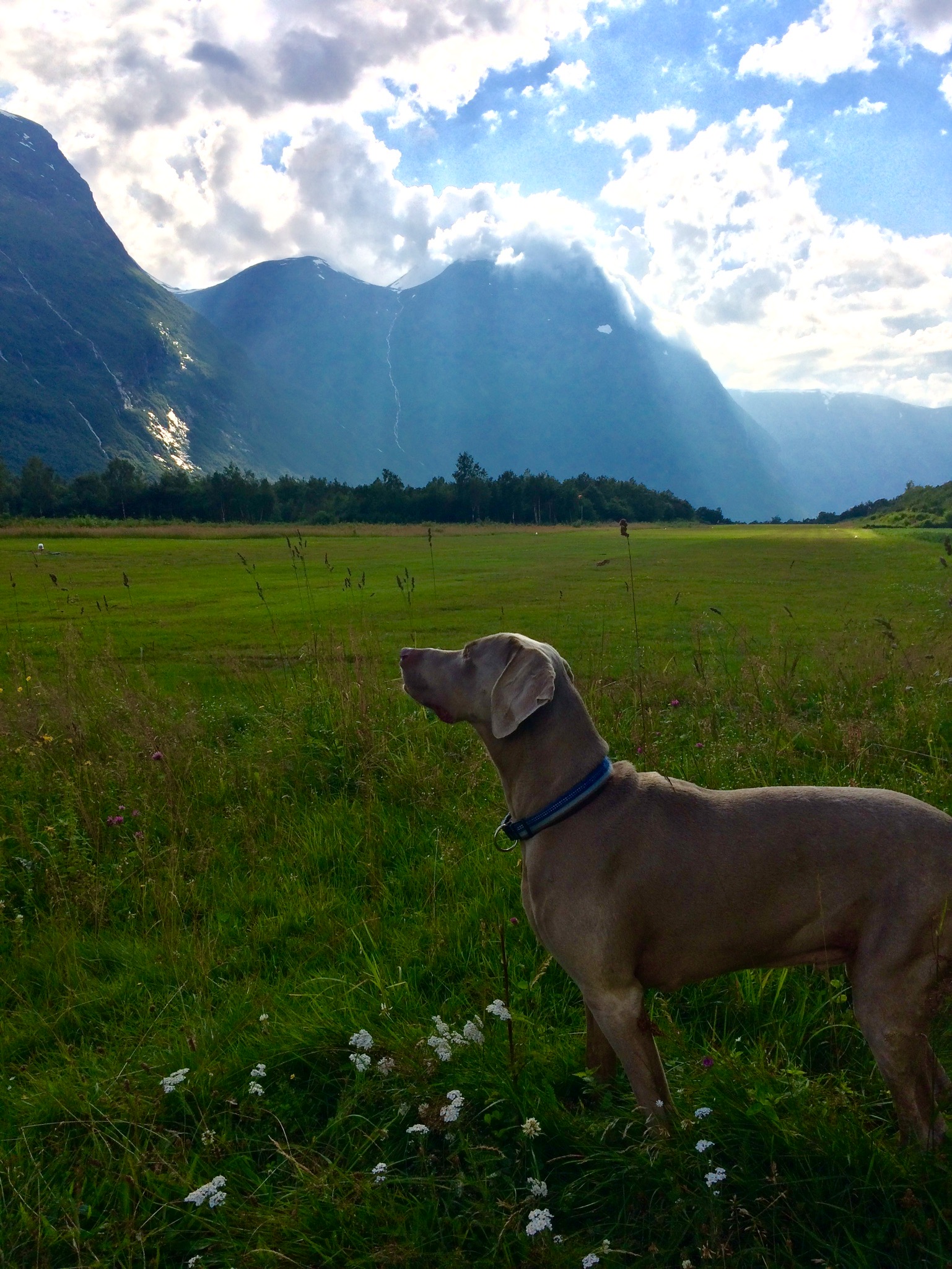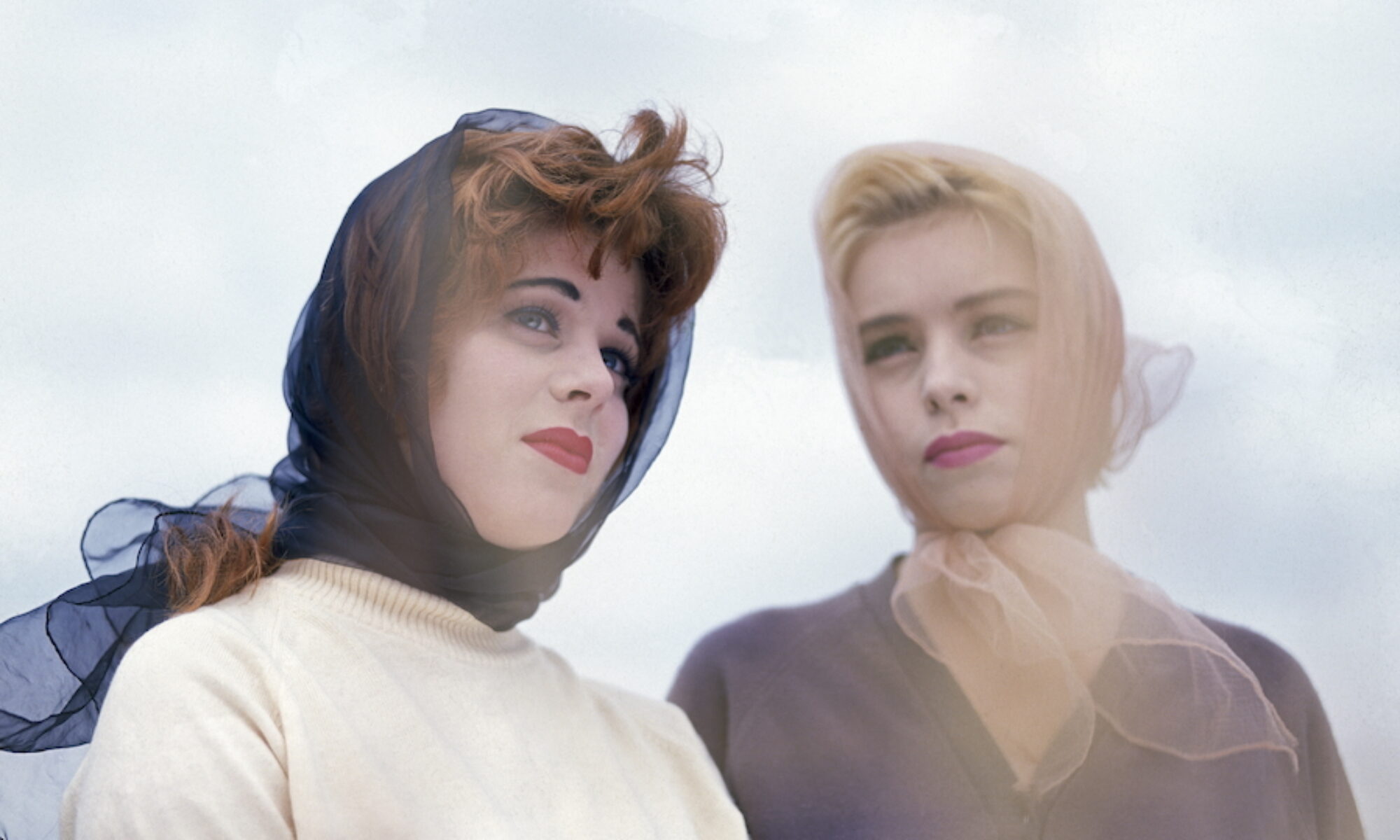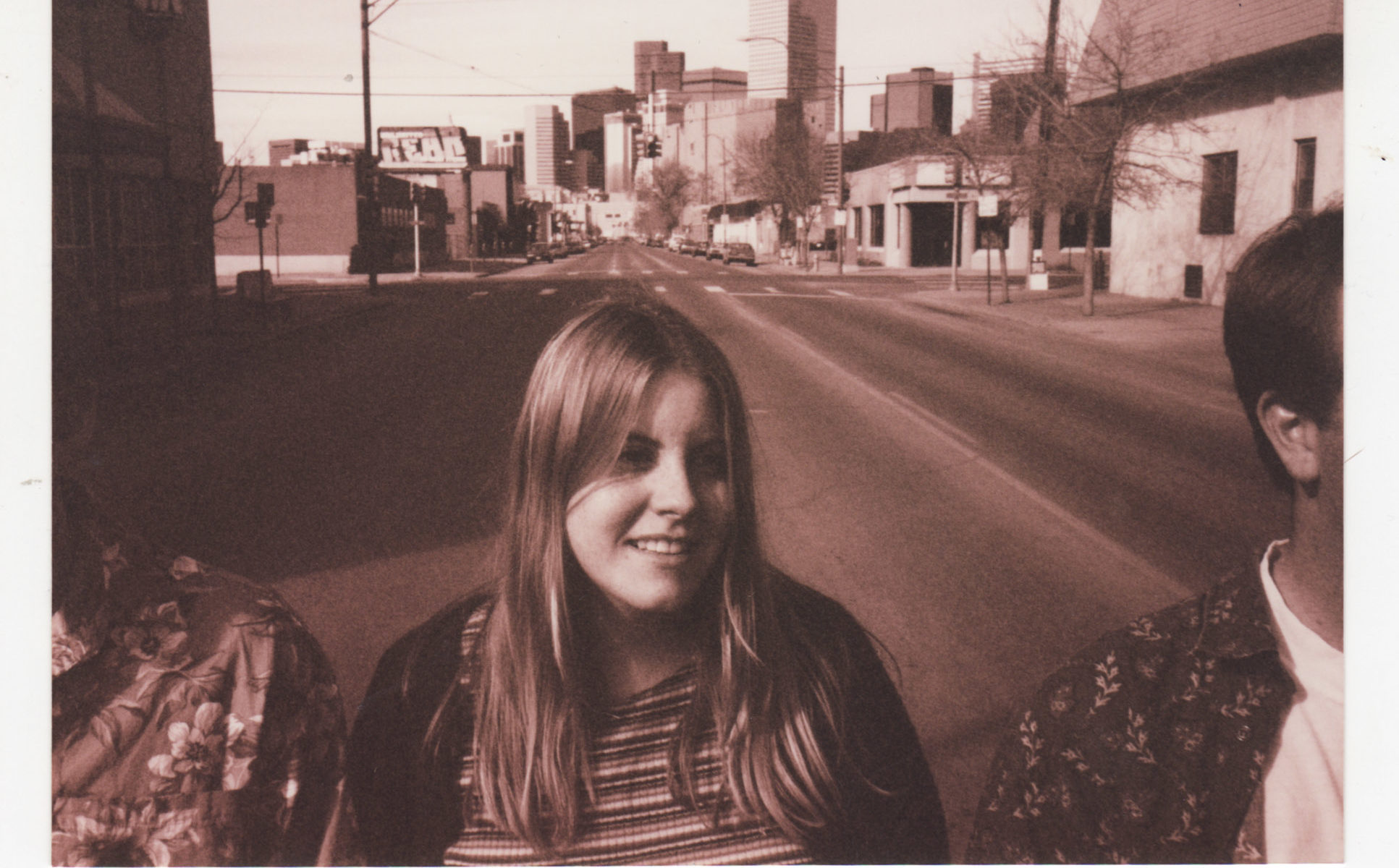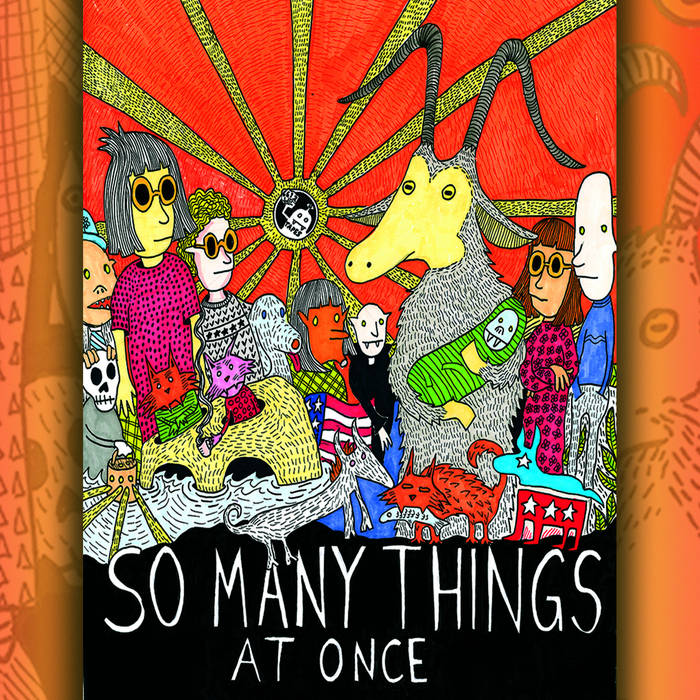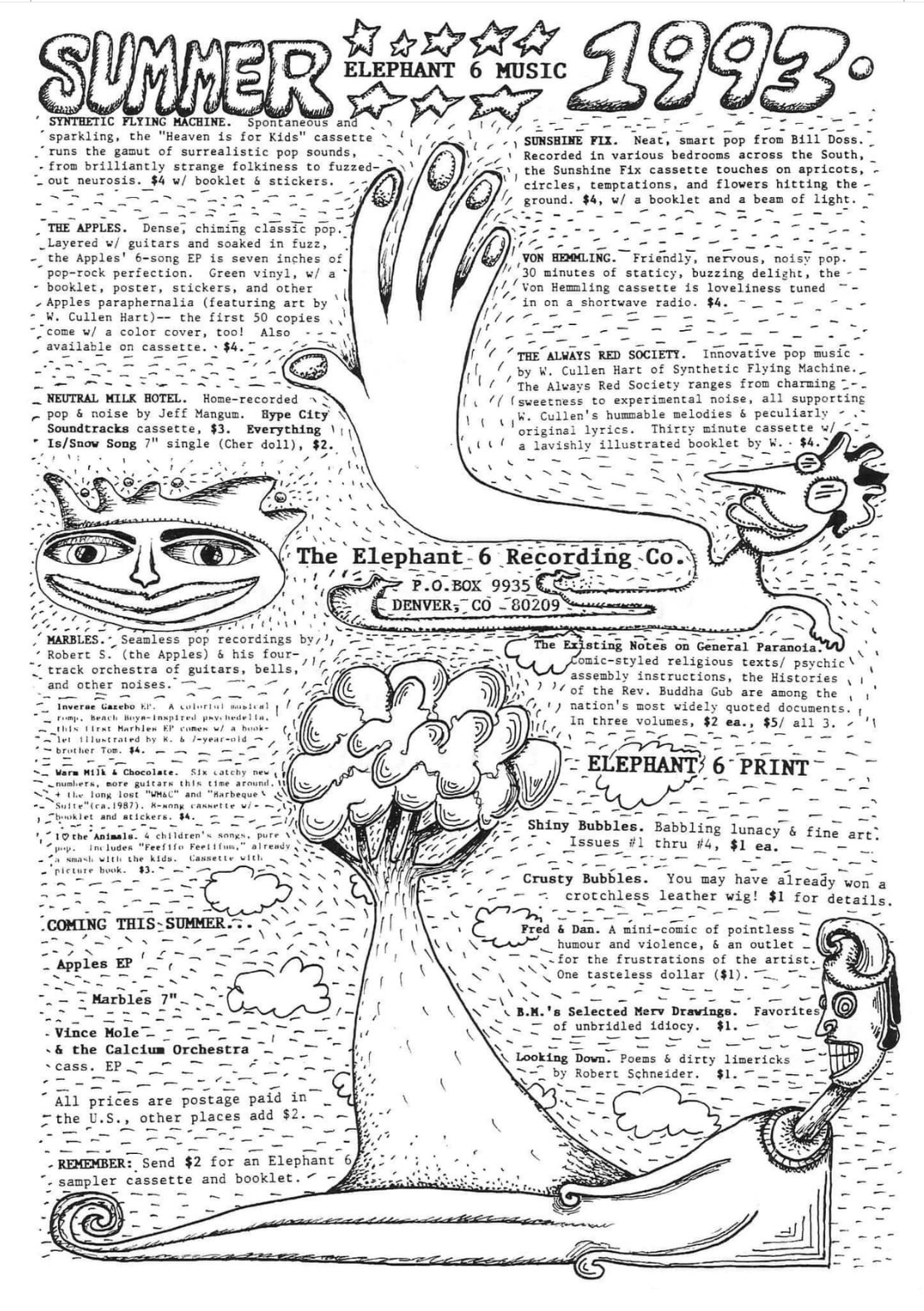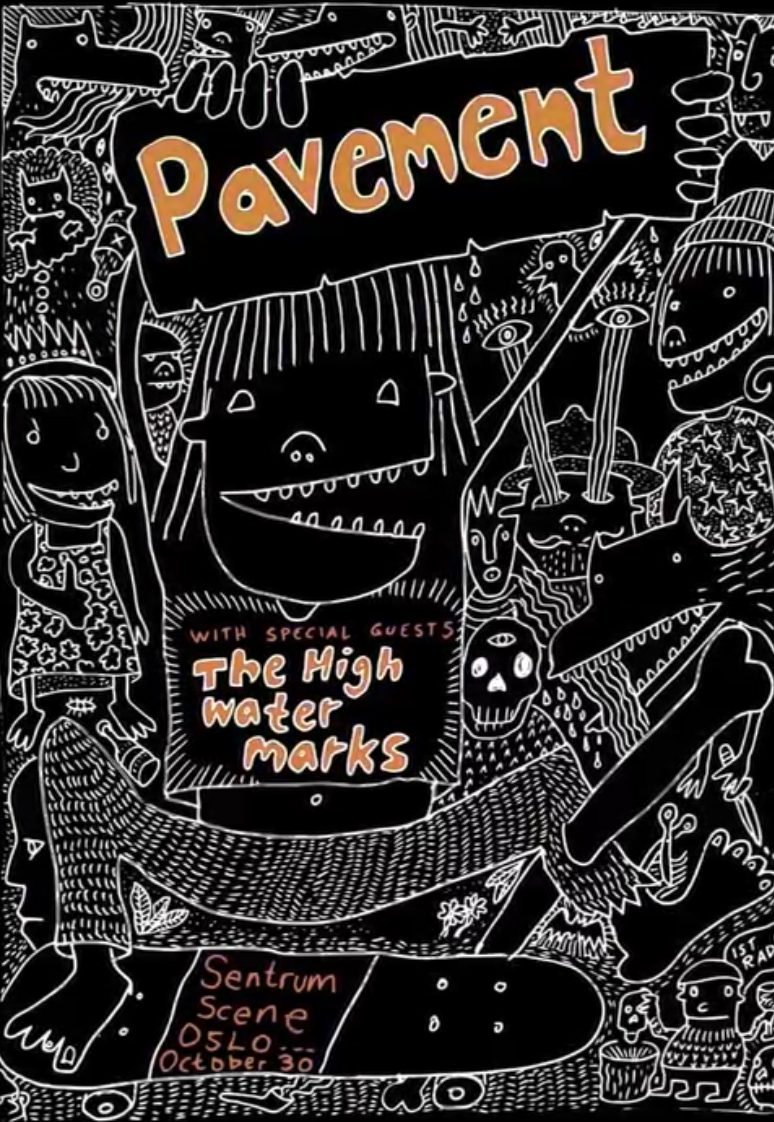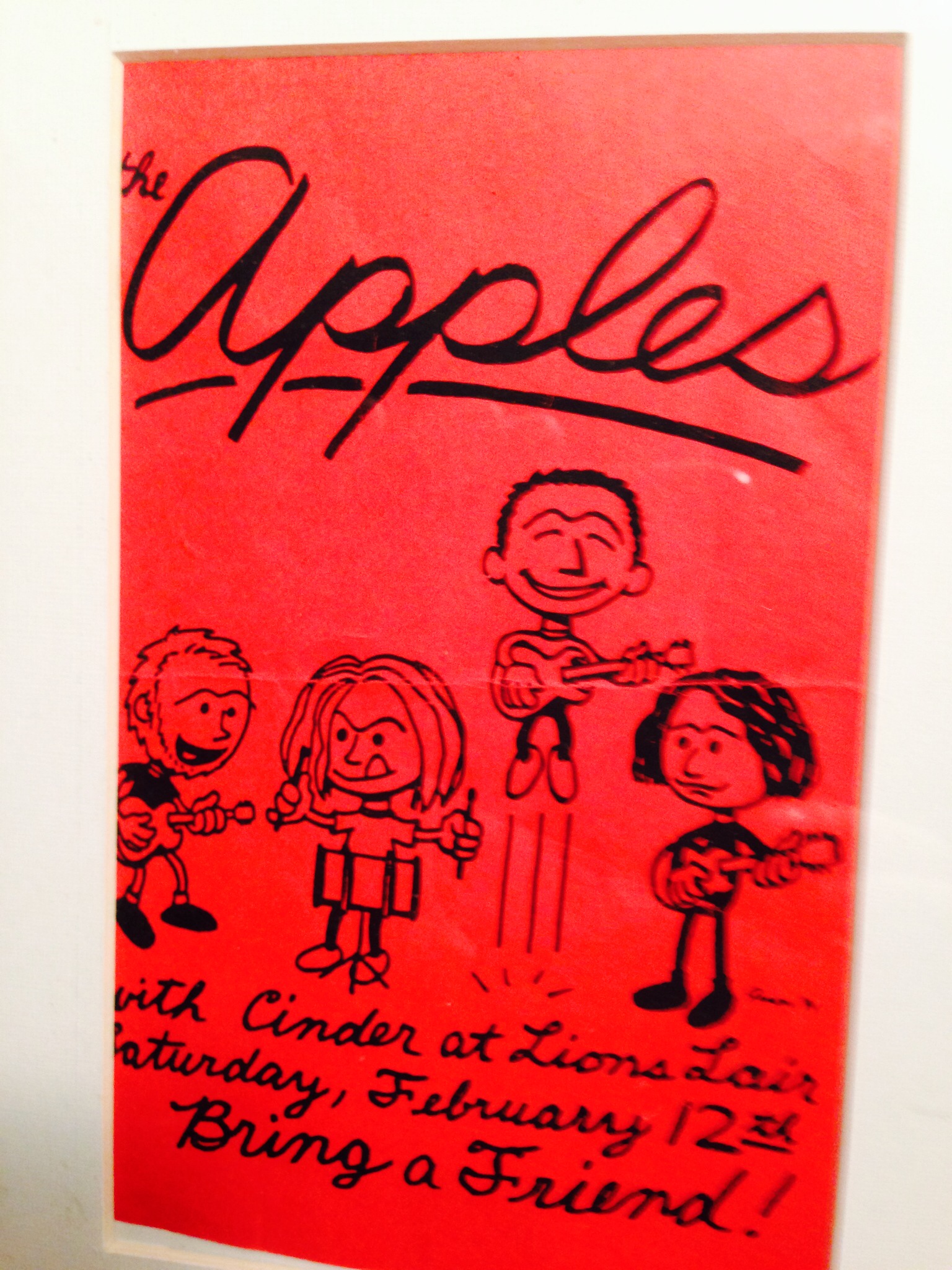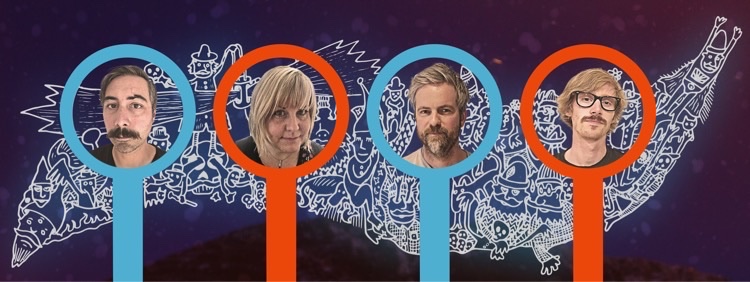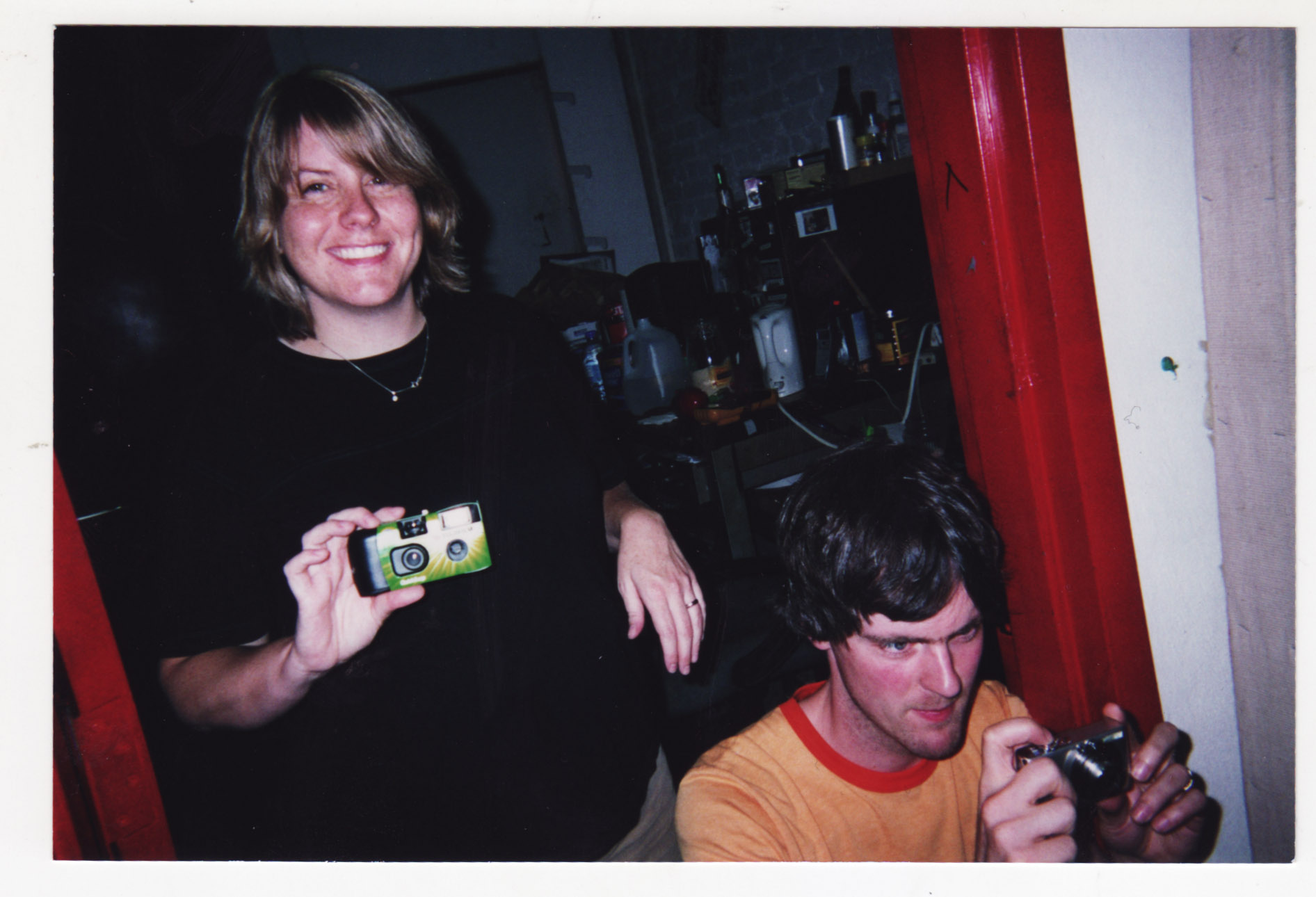
Hilarie and Jennifer in conversation, part one
“My own happiness and well-being are strongly correlated with my ability to create something,” Hilarie Sidney told 15 Questions. (We can relate!) Hilarie (she/her) is a multi-instrumentalist and songwriter who was the drummer from the Apples in Stereo (through 2006), a cofounder of the Elephant 6 collective, a member of Von Hemmling and Secret Square, and currently in the High Water Marks (along with her hubby, Per Ole Bratset, Logan Miller & Øystein Megård), whose latest album, Your Next Wolf, came out last summer. Hilarie also runs a cassette label called 6612 Tapes that will release So Many Things at Once, a benefit compilation for Justice Democrats featuring HWMs, Rose Melberg, the Garment District, the Ladybug Transistor, the Natvral, Dressy Bessy and others, out April 5.
This interview is part one of a two-part series that is a result of longtime friends Hilarie and Jennifer Baron (the Garment District, the Ladybug Transistor) having a conversation about everything from fertility cults and Norwegian pizza to body shaming and airport jail. Hilarie was at home in Grøa, Norway, and Jennifer was in Pittsburgh. (Images courtesy of Hilarie) Read part two.
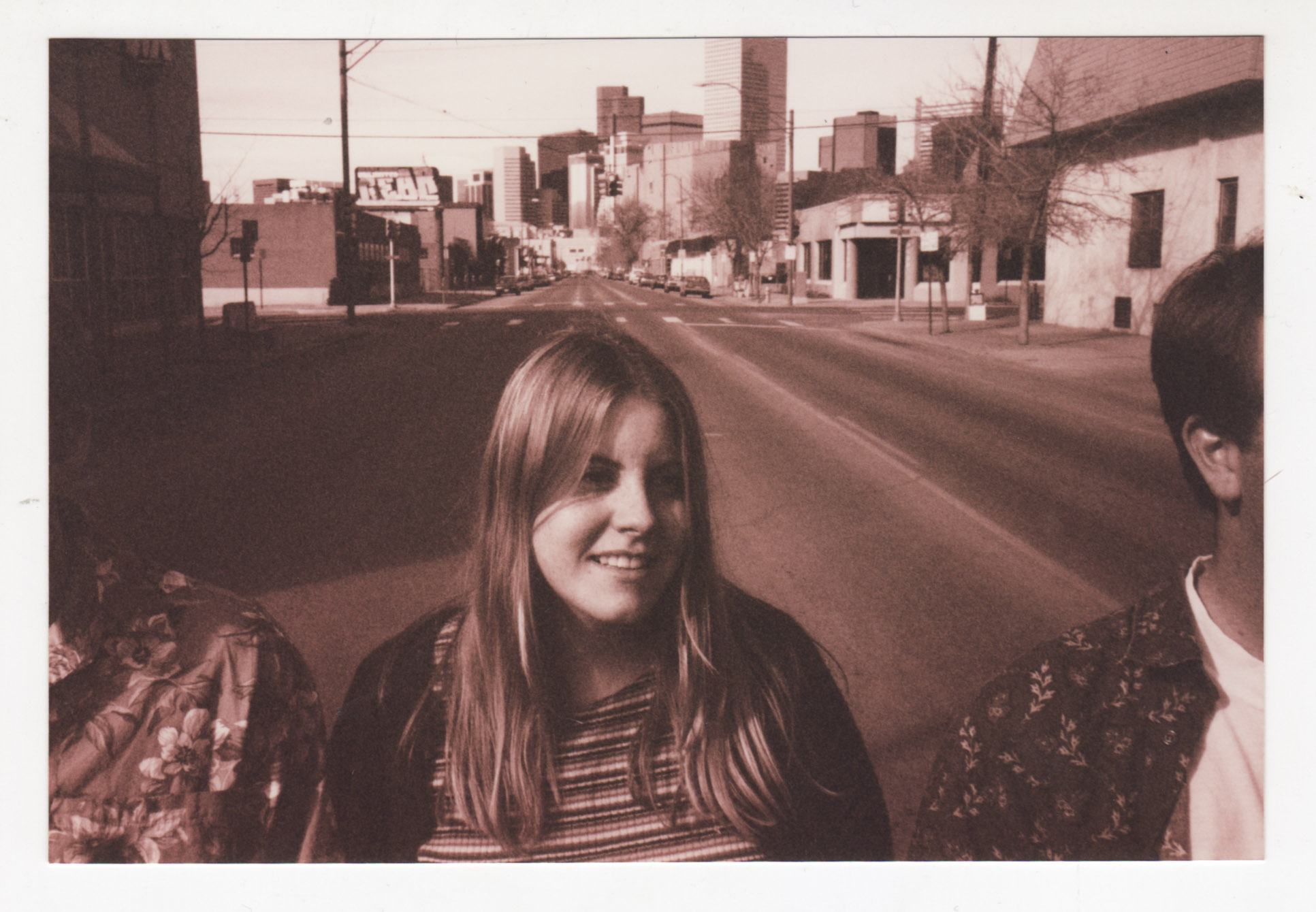
Jennifer: Was music a big part of your upbringing?
Hilarie: My parents were really into music. They loved The Beatles. My siblings are older, they were born in the ’50s and ’60s. The whole family listened to The Beatles and the Beach Boys. My sister was 13 years older than me and she loved Black Sabbath, KISS, Alice Cooper and Grand Funk Railroad. My brother Roger was into stuff like Yes, Genesis with Peter Gabriel, Emerson, Lake and Palmer. More mellow kind of proggy stuff. My brother who’s 9 years older than me was into Devo and the Cars and ’80s pop. So I heard all sorts of different music coming from all the different bedrooms. I would go in their rooms when they weren’t home and look through their albums. My sister had a Grand Funk Railroad album and they’re all naked on the inside and I would always go in there and look at it like, oh my god, their penises. My dad was in a barbershop quartet. I played clarinet—I started at the end of grade school until middle school, and then I switched to guitar. Then I picked up drums when I asked if I could be the drummer for the Apples. Music was always on. It was always important. I always liked the boys in school who liked music and were like guitar players.
Jennifer: That’s our downfall, isn’t it. We share that. How did the High Water Marks get started as a band?
Hilarie: I met Per Ole, who’s now my husband, on an Apples tour in Oslo. He gave me some songs that he had with his band. We started talking on e-mail and we decided to do an album. We were like, let’s send songs back and forth. The thing that was super funny is first he sent his 4-track tapes and didn’t send a return address and he had my name wrong. It came eventually to my brother’s house in Lexington, KY.
Where were you?
Hilarie: I was in Lexington too, but it was just bizarre because he’s like “I have a package for you from Norway.” I was like, really? Oh my god, that’s so weird.” So I got the tapes. But they could have been lost and there was no backup.
Jennifer: That’s a great origin story. We’ve been talking a lot about physical mail and the sense of waiting and anticipation and that it could have been lost and that it was 4-track tapes. How did you continue your long-distance creative process?
Hilarie: I recorded them on to his tracks, I added to them. I sent a couple of tracks that I wanted him to add to, which he did. Eventually we just decided … I was on tour, I’d made a little bit of money. Flights were really cheap so I was like, I’m going to come out there and we’re going to just do this. We’ll knock it out really quick. I’d just started recording on a computer. It was exciting to have a huge audio interface that looks like a rack mount thing in my backpack and some nice microphones.
Jennifer: You traveled thousands of miles to make music. That’s so endearing.
Hilarie: It was really cool. We became best friends right away. We really clicked and it’s so weird. All of it happened so organically and innocently. And then bam, We’re like in love. We were like, we have to be together. We can’t go back.
Jennifer: How did you come up with the name?
Hilarie: It was the name of one of the songs that he recorded. Songs About the Ocean came out in 2004, this year is the 20th anniversary. A couple years later, Polar came out, and then we didn’t do anything for like 13 years. In 2020, we put out Ecstasy Rhymes, in 2022, we put out Proclaimer of Things. In 2023, we put out Your Next Wolf.
Jennifer: Do you still have the 4-track cassettes?
Hilarie: We don’t. We can’t find them anywhere. We lost some weird and important stuff when we moved. We had a moving company and a shipping container and some of the boxes just didn’t show up and the company didn’t take any responsibility for it and it was a huge hassle. I don’t think we’re ever going to find them.
Jennifer: Your label is putting out a new compilation. I’d love to hear about the tape label in general. I’m honored to be on it.
Hilarie: 6612 Tapes started because we wanted to put out our new album on cassette. It’s such a cool format. I love what you can do with it. How compact it is. We just decided to do a tape label and all eco packaging. No shrink wrap. It’s also going to have a homemade vibe where we’re going to put inserts and stickers and stuff. We’re putting out a new compilation tape called So Many Things at Once, it’s a benefit for Justice Democrats, coming out April 5. We’re doing it because democracy is in peril. So many things are so fucked up right now with Palestine and Ukraine. Now there’s bombing going on in the Red Sea. We’ve got to take care of this election because it’s going to have an impact on everybody. It will not be on streaming because we want to get money for the donations.
Jennifer: Are you planning other cassette releases?
Hilarie: Because we have a 20-year anniversary coming of our first album, we’re going to do some fun things, like we have some old recordings that we did on the radio here in 2004 so we’re going to put those on the tape; we’re doing something really cool with our bandmates where they’re reimagining a couple of the songs from the record. We’re going to put out some unreleased stuff as a way to celebrate it. That and our next record will be on the cassette label later this year or early 2025.
Jennifer: You’ve been so incredibly productive. It’s so inspiring.
Hilarie: It must be that fertility cult.
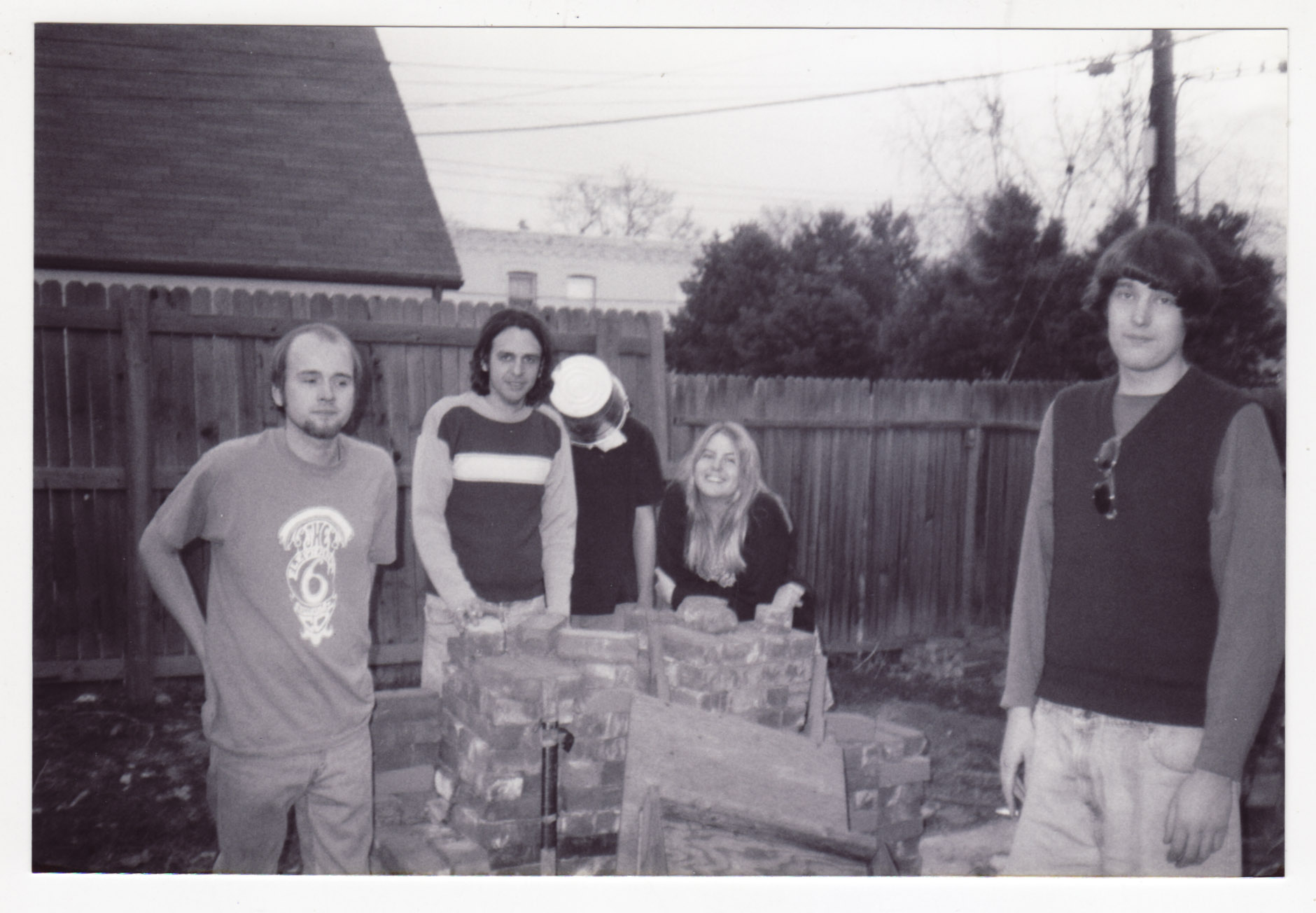
Jennifer: Tell us about the Elephant 6 documentary. Has it reconnected people?
Hilarie: It made us remember how much we cared about each other and how stupid it is that we haven’t been in touch, especially when it’s so easy to be in touch. It’s never been easier. For my part, after Robert and I got divorced, a lot of people … I don’t want to say they chose him over me, but they chose him over me. That’s just the way it goes. He’s a talented, popular guy. A lot of people lost touch with me or I lost touch with them and it’s been fun getting to know everybody again. We’re all the same, but we’re so different.
Jennifer: I’ve loved seeing it multiple times and have been so inspired by all of you. It’s been great reconnecting with people as well. Derek and I did two Q&As after the Pittsburgh premiere. The audiences were so different the two nights. The first was our generation, in-depth questions, like uberfans, rabid fans, like so many deep things. Just people reminiscing and wanting to know every little detail and talk about all the bands that weren’t in it and who were. We had to kick people out or we would have been there for 5 hours. The next night was all these new fans, younger audience. It was so cool to be able to have that mix. It speaks to the timelessness of the music and that communal culture and that sharing and that hands-on DIY aesthetic that people are craving. And also over the summer having everyone come together in Norway.
Hilarie: Yeah, that was so amazing. Circling back to the tape label, when we talked about the spirit of Elephant 6, 6612 reminds me of when we started Elephant 6, because it’s all about handmade and having personal things in the release as possible and connecting on a personal level and that was one of the greatest things about what we did. I’m so proud of that, but I’m also in awe that we did that too.
Jennifer: And there’s so much more beyond the parameters of the film that went on.
Hilarie: The film is just a really good tip of the iceberg there. It was really well put together.
Jennifer: How does how does it impact your working today? Also, could that happen today?
Hilarie: I don’t think it could. I mean, I’d love to think it could, but I don’t think it could. That whole instant gratification thing that we’re talking about. And like, if I can’t get it now, I’m going to kind of freak out. I need to hear it first.
Jennifer: There’s this whole mentality of having to create music for a film or show or streaming or video. I don’t create music that way. Truly living in the moment, it sounds so cliche, but it’s harder and harder to do that.
Hilarie: People don’t do that anymore. It’s too hard. We were so lucky back then because we didn’t have all these distractions. I lived in this tiny little apartment with Will and Jeff and me and Robert, we’re talking about music all day and all night because we didn’t have a TV, we couldn’t afford one.
Jennifer: If you watched a show, like Freaks and Geeks, you did while it was on, then it was over and you missed it.
Hilarie: There were no mobile telephones so if you wanted to see somebody, you were really immersed in it. We were so immersed in everything we did. We were just sitting there brainstorming and writing things out and drawing and coloring. We watch a lot of TV now, but we’re always drawing and tonight we’re going to do some lino cutting and we’re recording and I’m trying to keep that going. Back to the E6 documentary, it was the very end of that era between no technology and technology where everything was really free.
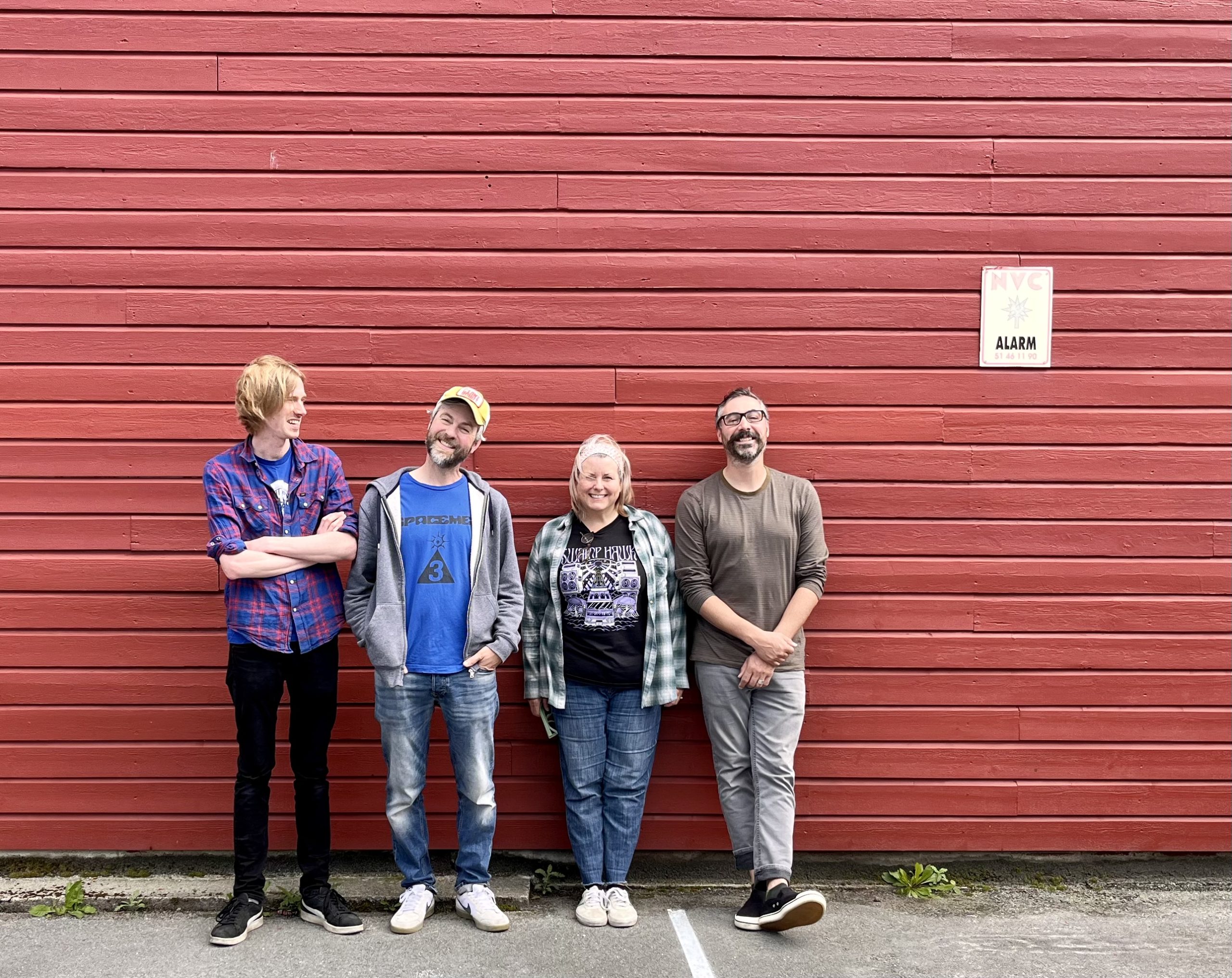
Jennifer: When did you start speaking Norwegian?
Hilarie: Well, it is hard. I studied it a little bit at university after we met, I was going back for my bachelor’s and I switched to Norwegian studies from sociology. I finished my degree and I still couldn’t really speak Norwegian though. I don’t know if all people are like this, but I couldn’t pick it up until I started using it every day. I’m good with the grammar. I knew how things went together, but I couldn’t get it out quick enough; it just took some time. Working with kids helps because they’re honest. They’re like “what are you trying to say?” You’re formulating sentences in your head like you would if you’re going to write them down, but that doesn’t work.
Jennifer: Let’s talk about gender roles in bands. In the ’90s, it was so great to meet you, meet Shivika (Asthana, from Papas Fritas), we toured with a lot of bands that had women I love and am still in touch with. It felt like a tightknit community. That was the positive side of it.
Hilarie: I was thinking about how we would tour; we’d be in New York or whatever, and there’s all these women and men and everybody’s integrated and doing things together. And then suddenly, you’re in Nebraska and you’ve got this guy who’s like, “you’re not in the band.” I had that happen to me before. “I’m in the band, I need to come in.” “No, you’re not in the band.”
Jennifer: “Who are you with?”
Hilarie: “Who are you trying to see?” “Well, I’m the drummer in the Apples in Stereo. I need to come in.” “Yeah, right.” Finally, after arguing, he goes and gets John or Eric or somebody. They’re like, yeah, she is in the band.
Jennifer: This wasn’t even that long ago. I totally agree about New York almost being another world. I always have this thing that still happens: “Oh, you’re in a band. Are you the singer?”
Hilarie: Yes.
Jennifer: Nothing against singing, it’s an amazing talent. But it’s this kneejerk reaction that still constantly happens. Also “woman-fronted band,” hate that term. What does that even mean? Can you imagine discussing the Kinks and said “male-fronted band”?
Hilarie: Exactly. It’s so stupid.
Jennifer: Let’s talk about the music we’re making. It’s so hard for people to even describe and talk about music and most art forms but mostly music because we can’t touch it, we can’t see it. It’s constantly in the background. It’s in all these videos. Social media has made music this background thing where people are numb to the art form so if you have to work to listen to something and figure it out, you have to be challenged to think about it, people’s minds can’t do it if they’re born into the digital age.
Hilarie: No, they can’t.
Jennifer: I still have a lot of difficult feelings about gender roles and music. It’s hard to even process.
Hilarie: Well, outside of even like the instrumentation aspect of music, I had a lot of problems being a female in a band who’s overweight, because I was criticized. Jeff Price from SpinArt, he told me that I was holding the band back from success because I was too fat.
Jennifer: No, Hilarie.
Hilarie: Yeah, he did. I was crushed. He’s like, if you’re going to be in a band and if you’re a girl, you need to dress like really cute and you need to be really thin. Sure, whatever, dude. I acted like it didn’t bother me, but it still really bothers me to this day.
Jennifer: It’s horrifying, it’s traumatic, it’s harmful. The body shaming and the awareness about it now, we didn’t have during our time. Or reviews would be written, and someone would describe what Sasha and I were wearing, but they wouldn’t describe what the guys were wearing. Why would you describe our hair or our clothing?
Hilarie: Jeff never would have said that any of the guys are fat or too bald or whatever.
Jennifer: That’s horrifying. When people who are running labels or in leadership or power positions are saying these things, it’s so harmful. With openness and inclusivity and queer music and culture and gender affirmation and body awareness and fighting body shaming is much as it is today, that didn’t exist in the ’90s when we were starting our bands and way before that.
Hilarie: It is still there. And we came up with really amazing female figures to look up to, like all the K Records and Kill Rock Stars, like Heather from Beat Happening, she was like my hero.
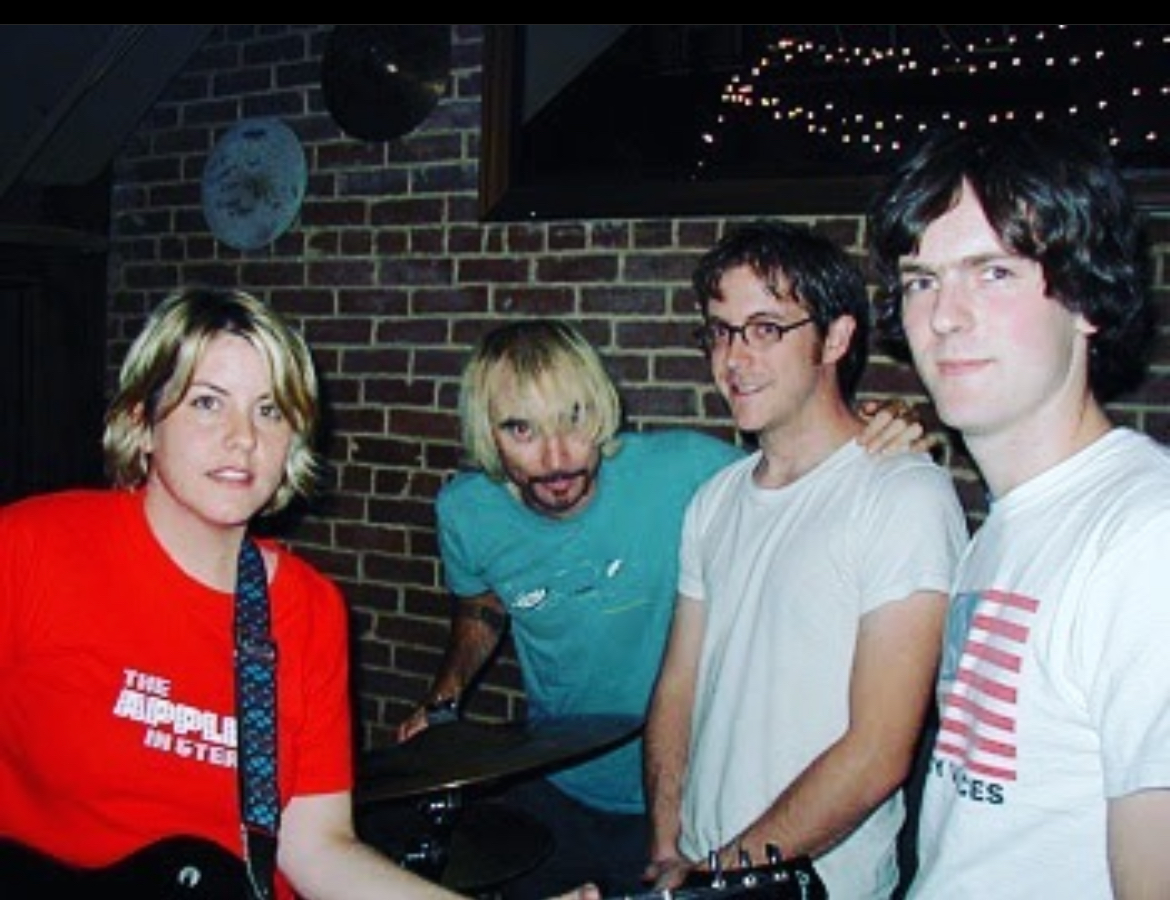
Jennifer: I got to see them play. Even going back, the Go-Betweens, New Order, like there are so many incredible women who are part of bands writing music, adding to the music, part of the arrangements, like adding to the sound, but why do we only talk about the singer?
Hilarie: Yeah, exactly, it’s not the only part. There were so many amazing women when we were coming up and you still don’t really hear about them like you hear about others.
Jennifer: Incredible composers too. Do you know about the Women in Sound zine? You would love it. It’s an incredible zine that my friend Madeline Campbell started and it’s really inspiring. It’s a great resource and a fantastic publication. … That experience horrifies me that that happened and I’m so sorry.
Hilarie: That’s just the way stuff was back then. I took it to heart. I acted like, oh whatever, but and I actually stopped eating and I lost weight, and I got like really freaked out. Yeah, it still bothers me today. Sometimes when I think about it, I still get really mad.
Jennifer: Understandable. If we thought about this topic, we would have so many examples.
Hilarie: So many.
Jennifer: So many of them were subtle and manipulative back then and we were really young and our brains weren’t even trained to process it and interpret it as sexism or chauvinism or misogyny at the time.
Hilarie: Yeah, I didn’t know those words back then. I mean, I knew them, but I didn’t really know them.
Jennifer: Yeah, we just brushed it off.
Hilarie: Yeah, it’s just like, oh, well, whatever, that guy’s a dick. But in the meantime, it’s sitting back there in your head and you’re playing it over and over.
Jennifer: Yeah. When you’re in your own cocoon of women in your band, women are in all the bands you’re on bills with then you go into some of these places like Panama City…
Hilarie: …and you’ve got the metal guy who’s doing sound and he doesn’t get what you’re doing and he’s like, “why do you have this stuff?” He has no idea what to do with you.
Jennifer: If we were to visit you in Grøa, what should do and see?
Hilarie: It would all be outdoors. We don’t really have anything else to do here. We have a mall and it’s very boring and the restaurants are all pizza I feel like and it’s terrible pizza.
Jennifer: Norwegian pizza!
Hilarie: I would take you guys … about a 15-minute walk from my house is one of the oldest Viking graveyards in the western part of Norway. Where we live right now, it was a special gathering place in the Iron Age, where they came to pray to the fertility God Freyr. There are fertility cults here and they’ve excavated a lot of fertility pits, like fire pits where they did sacrifice. There are a lot of graves here that were excavated and there are some important women who were buried as well as like families. It’s a cool place. Being in there, it feels mystical and magical. It dates back to the 900s, right in the middle of the early Viking age.
Jennifer: Tell us about the latest High Water Marks album Your Next Wolf.
Hilarie: We’ve just been on such a roll with recording. Ecstasy Rhymes is a really mellow like pop record and the next one, Proclaimer of Things, was a bit of that, but also a bit more rock. Then we took it all more fuzzy pop on this last one. We’ve just been recording and writing so much and we just kept going. It’s not like we just sat down and said “we’re making this record.” We just kept working. We record our parts here at our house. And then we send the tracks to Øystein and Logan. We have a shared Google Drive where we all put our parts and we put our all of our information. As we get closer to being done, we have Google Keep and we keep each other on task, like Hilarie needs to do this, this, this, Per Ole needs to do this, this, this, and so on. Then we can cross it off. It’s really organized. It’s not my idea; Øystein is so organized, he’s the one who introduced us to that.
Jennifer: Where do you record in your house, different rooms?
Hilarie: We have a tiny little bedroom that we record in that we’ve made into a studio, it has a desk and a big bookshelf and a little vintage cabinet and then all of our guitars are on the wall. We record on a Mac Mini. We just recorded in there but when I record drums, we have to do it in the hallway because they won’t fit in there. I can’t do it any other way. I’ve had bad experiences in studios, I don’t like recording in studios.
Jennifer: I didn’t know if you had ever recorded in a studio in Norway.
Hilarie: I got to help mix and kind of produce some songs that Per Ole’s band was doing when I first came over to record. That was fun. But that wasn’t my project, and it wasn’t my time, so it was pleasant.
Jennifer: Recording in a home, whether it’s your home or it’s close to where you live, or your friend is what I’ve tried to do. Just the organic nature or that comfort feeling and not constantly staring at the clock.
Hilarie: That’s a real creative killer.
Jennifer: It is so difficult. I try to strike this balance of I’m recording with people who also have become friends because I have to feel really comfortable with the person.
Hilarie: Yeah, me too.
Jennifer: You guys are recording your own music and that’s amazing. But I like to work with like an engineer to oversee it all and produce it. I like to have someone else worrying about being the technical expert, because I’m not that as far as the engineering side and I don’t really want to be. I love focusing on the creativity of the songwriting and the recording. I love all these processes. I know that that’s not my skill, my strong point, but it is a balance that you have to strike. I’ve recorded in studios and had positive experiences, but I much prefer when it’s a home-based experience. It can be stressful and difficult. It can hinder your creativity or experimentation to just be like, OK, we’ll book you on these dates in and out.
Hilarie: It doesn’t always work out that you feel at your best at those moments. We’re busy and older too. I can’t be bothered. I can’t spend that much money either because we pay for so much of these records ourselves.
Jennifer: Before I started recording my new album, I visited some incredible studios and they’re doing wonderful work and they’re beautiful spaces, but I can’t afford them, I’m in the same situation. So, if I’m going to be putting my own investment into it, which I am because I’m paying for studios and engineering, I love that I can put it toward like an independent person who is incredible to work with. I worked with someone whose personality is very chill and laidback, great listener, great rapport. We’ve become good friends and he’s been incredibly generous with his time so I feel really fortunate. It feels comfortable. Some of the experimentation or the parts of the directions you go in in the studio, you wouldn’t be able to do in a different kind of setting.
Hilarie: That’s a really perfect scenario.
Jennifer: It still doesn’t mean that it’s not expensive and it should be paid for. What was the mixing like?
Hilarie: We mixed this time with Justin Pizzoferrato, who is J Mascis’ engineer who works with the Lou Barlow and Speedy Ortiz and lots of different artists. He would basically do a mix and send it to us and we would say what we thought, and then he’d do another one and send it and it kind of went like that. But he was so good. We weren’t arguing about anything really. He was such a pro, so great to work with. Really nice, talented guy. We’re also lucky because Øystein has worked at a studio and he has so much equipment. He has two Mellotrons and Hammond B3s. Tons of keyboards. He’s got like several drum sets, so many amps, they rent out some of their stuff. He does a lot of the technical stuff and Logan also is very like good and interested in recording.
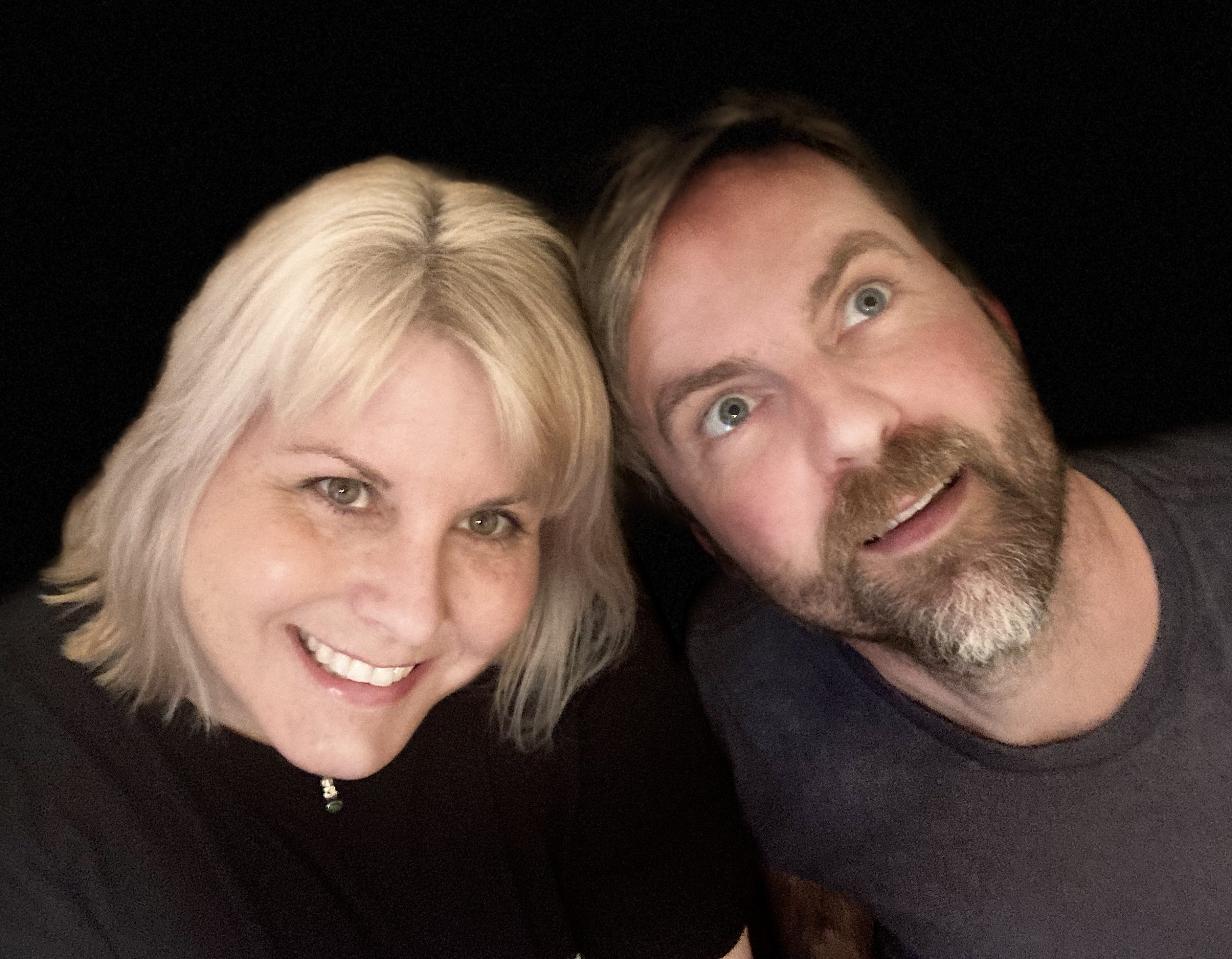
Jennifer: Do they bring their equipment to your house ever or do they all record in their houses?
Hilarie: Everybody records in their houses. Your Next Wolf was the first time we recorded all together. We went to Kentucky and recorded the basic tracks of 4 of them. It was a fun bonding experience. We had a great time. We recorded at Logan’s house.
Jennifer: Was it the first time that some of them coming to Kentucky? Hilarie: It was Øystein’s first time in Kentucky and I think in the U.S. That was fun, we went to Cincinnati and showed them around. There’s not a lot to do around Lexington, but I think they had a great time. It was just really chill.
Jennifer: Who pressed your latest vinyl?
Hilarie: We did it at a place in Paris. We paid for it ourselves. It was so hard to decide because we had to ship most of them to Red Eye anyway in the U.S. I don’t know if we did the right thing, but it was cheap. They have a like a two-month turnaround, which was really quick. They don’t use the stamper, they use the original lathe cutting, the lacquer. It doesn’t feel real if it’s not on vinyl. I’m really into cassettes right now.
Jennifer: Me too. It’s interesting how many people on our most recent Ladybug tour wanted CDs. What do you enjoy most about recording, performing, and or touring? Do you prefer one or the other? Do you dislike any of them?
Hilarie: I prefer recording to touring. I like playing shows, but I get terrible anxiety but then while I’m doing it, it’s always really fun and I’m like, why don’t we do this all the time? And then the next time it’s like, oh my god, we have a show. I can’t do this. And then we do it and it’s fun. It’s this weird cycle of anxiety and then elation. I have so much fun whenever we play live. But it’s just like the whole getting there is like… Øystein’s in Trondheim, Logan’s in Kentucky, so this summer we played shows and Logan came over from Kentucky for just these few shows that we did. We had like three days to practice here. Thinking about doing it is really daunting, but once we do it, it’s really amazing. And Logan’s lucky because his wife is a pilot. She’s my best friend. She’s a pilot for Southwest and she can get them on flights pretty cheap sometimes. Her dad was also a pilot, so she has United tickets and stuff like that.
Jennifer: She’s such a trailblazer because there are so few female pilots working for the major airlines. There are more than there used to be.
Hilarie: She has cooler clothes now. When she first started out, she wore the stupidest outfit and she used to call it her birth control suit.
Jennifer: That’s amazing. That would be a good band name. It is a lot of logistics as you get older.
Hilarie: Yeah, some places have backlines, some places don’t. Living in Norway is great and playing shows here is not so great. The music scene is pretty generic or maybe I haven’t found the right thing. They play us on the radio here. We have a lot of streams coming from here, from Norway, a lot of streams. It seems like people like us, but we can’t get people out to the shows. It’s frustrating, but a lot of venues say that people just don’t go to shows anymore, so they’re having a hard time promoting and getting people to come out. We wonder if it’s worth it.
Jennifer: Is that true in Bergen and Oslo as well?
Hilarie: Yeah, everywhere. Everything is just so expensive and it hasn’t really come down, especially since the pandemic. Norwegians were more reserved and homebodies and maybe the pandemic has made everybody feel like it’s OK to stay home.
Jennifer: I need social interaction, playing off the energy of people and the chemistry. Got any good tour stories?
Hilarie: I have a few. One I was thinking about was: OK, first of all, Apples in Stereo used to drive around with the Bible on our dashboard because we have this whole schtick where we’re this religious band in case we ever get pulled over because the boys had a lot of weed on them all the time. We’re driving around with this bible, we have this whole backstory. We played at Oberlin College and we had a great show. But it was over pretty early, as college shows are sometimes, and we say goodbye to everybody, we go back to the hotel and we’re hanging out. The boys are smoking bowls. Eric and I are sitting there counting money and what have you. We wake up the next day and we go to Denny’s, which is right outside the hotel. And then suddenly we see cop cars pull up to the hotel. We were all just kind of looking and then Robert was like, “Oh my God, my backpack’s in the lobby and it’s got all the pot in it.” We got in the car and started driving to Wendy’s. Robert goes into the Wendy’s. John was driving and he didn’t have a license. I switched seats with him, and I got in the driver’s seat and then Robert ran into Wendy’s, threw the pot away in the garbage can in the bathroom, and came out with a Big Gulp type thing.
These cops pull us over and they’re like, “Hey, who does this backpack belong to?” Robert’s like, “that’s my backpack.” The cops are like, “Do you realize that there’s marijuana in this backpack?” Robert’s like, “No! What? Are you kidding me?” We made a story first before the cops started talking to us. Robert is taken to the cop car and they talk to him and us separately. But we all say the same thing: We have no idea whether it’s pot in that bag. The cops are like, what are you talking about? We’re like, “we’re just a Christian rock band, we played at this college last night and everybody was doing drugs and stuff. We had no idea and we think somebody put that in our bag as a joke.” Robert had had picked up all these religious pamphlets and pulled them out and he was like, “Yeah, I was just giving people these and trying to get people to recognize Jesus as their lord and savior.” And by the end of the whole thing, the main cop and Robert were hugging and like they were best friends. Isn’t that insane?
Jennifer: Do you have any wild High Water Marks tour stories to share?
Hilarie: When we were touring in Europe, we had like 5 shows in England and the people who have booked the shows wanted to try to bypass getting a work permit. Per Ole didn’t need one because he was a Norwegian citizen at the time. So it’s just me and the other two guys that needed work permits and we talked about how we’d say we’re just going over to hang out and do a little studio recording. Our bass player was asleep when we were talking about it, I guess, and we didn’t realize it. So, we get to England, we go through customs, and we’re all through. And we see he’s talking and waving his hands and suddenly they’re looking at a computer. And he’s like, “We have shows. We’re in a band called the High Water Marks. Look at our website.” His phone got stolen on that tour too, because a guy came up and said, “can I borrow your phone?” And he said, “it’s from America but sure, go ahead!” And the guy just ran. He’s so gullible, but anyway, so we got marched off into jail in the airport. So, we’re sitting in jail and we have to be deported back to Sweden. We were in jail all day. They were nice, but it was embarrassing. They looked through all my stuff, they read my lyrics …. awful. There were people in there that were traffickers, a lady who tried to smuggle herself in, and then we’re just like a little indie band. It’s like a lockup room. At the end of the day, we had to get on the last flight. They had to march us on the flight, like with a great ceremony. It was really embarrassing, but it’s also funny now in hindsight.
Jennifer: What was it like playing in Egersund this summer the festival in Norway. How did that feel?
Hilarie: I love that festival. It’s the best festival because it feels small or intimate. I love how it’s set up in such a small area so you can go from show to show, and you have the hotel setup so if you get exhausted, you can go rest. It’s not the kind of festival where you’re like, “where am I going to get water?”
Jennifer: “Where am I going to wash my hands?”
Hilarie: Exactly. It’s really cozy. And I think Froda does such a nice job.
Jennifer: It’s like a family. Being able to do that before the pandemic, when Froda and Steven did this special deluxe reissue of Albemarle Sound and then meeting everyone and being a part of that community and making lifelong or new friends. After that whole experience of lockdown for us to all be together and reunite with you guys and have Elf Power and have the Elephant 6 documentary and Froda’s new band and No Ones and Minus Five just this past summer there was something so magical and so like necessary. People were just so desperate to be together and missed each other. It’s so important the way that they treat the bands and you can go take your break.
Hilarie: You feel so welcome. There’s no stress there. I didn’t feel any stress. I didn’t feel any of that hurry up and get on the stage. Hurry up and get off the stage. Hurry up and move your equipment.
Jennifer: We had to get a substitute drummer the same week of our show. So we had probably the biggest wild marathon of our musical careers, which then prepared us for the tour in November. So next to the hotel we were staying in that incredible historic building that was so cool. It was one of the most gorgeous buildings I’ve been in. Taking breaks to go swimming and walk around the town. Last time we got to stay in the lighthouse with Elf Power. It was a dream come true. It’s such a wonderful festival. So welcoming, like the way the whole town is waiting for it all year.
Hilarie: Everybody’s involved. There’s another festival in Norway that you guys should play sometime if you haven’t already. Indiefjord.
Jennifer: Gary has played it.
Hilarie: Yeah, it’s amazing. We actually played with Gary there.
Jennifer: Yes, I would love for the Garment District to play in Norway. Those experiences have been some of my favorite live music experiences.
Hilarie: The Norwegian summer is really magical.
Jennifer: What a beautiful landscape too, the Fjords.
Hilarie: You have to come up here where we are because it’s way more dramatic. It’s so much more beautiful up here.
Jennifer: I live vicariously through your photos on Instagram and I would love to visit. It looks like something out of a movie.
Hilarie: Right now it’s dark but in the summer I’m looking out the window and I see Europe’s tallest waterfall right out my window.
Jennifer: Even if you’re just there for a short time, you feel like you’re integrated into the community and the town and you’re just welcomed with open arms. There’s such a respect for the music and for artists and creativity.
Hilarie: There is. That’s one of the things I love about it.
Jennifer: What are some musical collaborations that have really impacted you?
Hilarie: One of the most fun collaborations for me was going to Japan to record with Cornelius. The entire experience was really fun both in the studio, and outside. Another fun collaboration was singing a song on the new The Go! Team record. It’s a song called “Sock it to me.” Although I didn’t collaborate in person and I did it from my home studio, it was still really fun. I think Ian is a super talented songwriter and arranger.
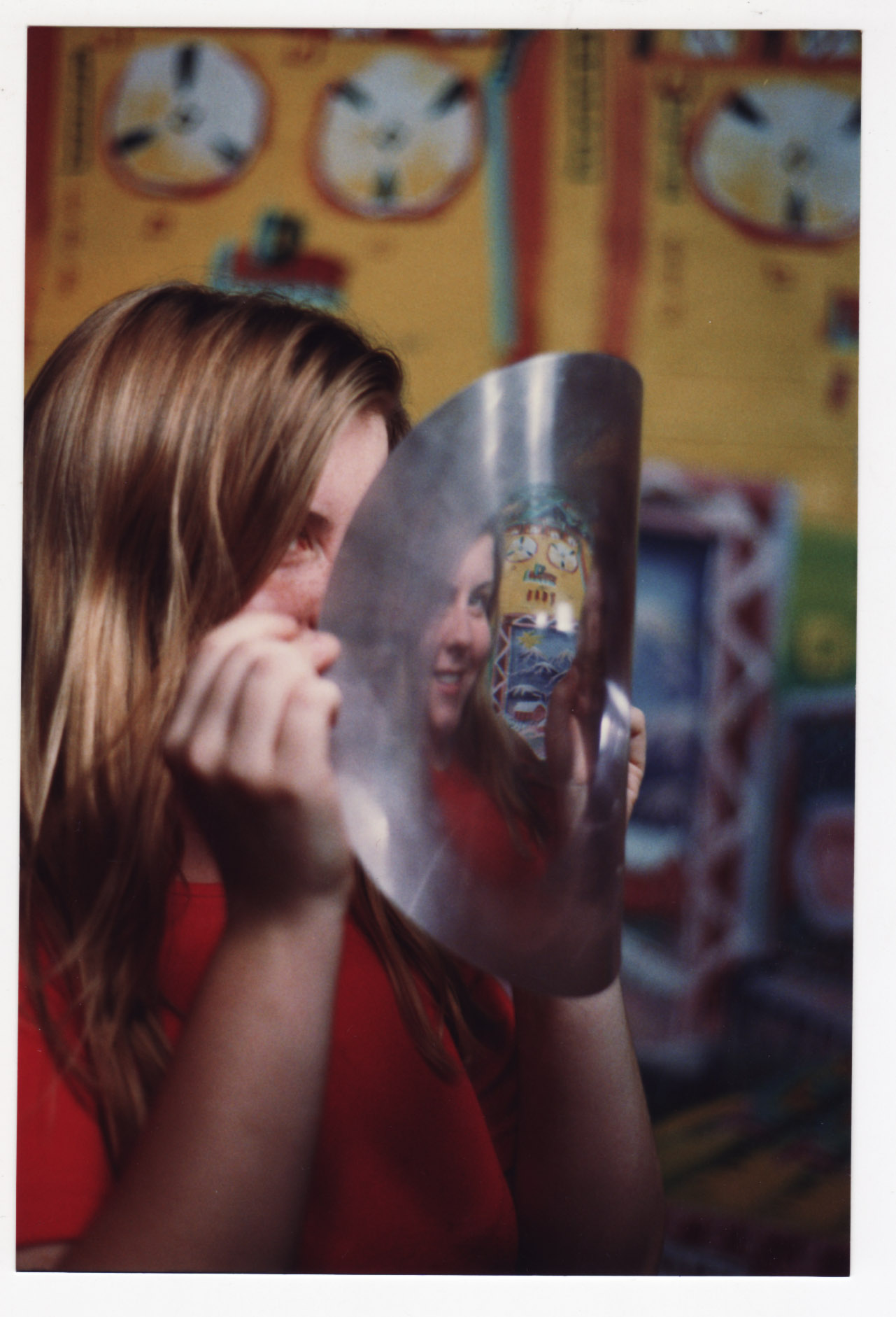
Jennifer: What is the best food you’ve ever eaten on tour?
Hilarie: Right now, at this point in my life most of the food I ate on tour I remember as being the best. I live in a place where we don’t have any good restaurants, and even if we did it is so expensive to eat out here. Many of my most memorable are probably some of the Ethiopian restaurants in D.C.
Jennifer: What’s your favorite thing to make?
Hilarie: I like to try new stuff. Everybody loves my quiche and my quiche crust that I make from scratch. I make enchiladas and things like that. I don’t use recipes because I’m really good at figuring stuff out without recipes. I take all the elements that I like from it. My downfall is that I never write it down. So sometimes it’s not super consistent. I make this like creamy pasta dish everybody loves but the consistency is different.
Jennifer: I’m glad I’m married to someone who’s a really good cook and I enjoy it. I often feel short on time. We always cook vegan because we’re vegan at home, but I would love to receive some of your recipes. I can always adapt them. We’ve been making a lot of dal and chana masala and I’m trying to experiment and use the Instant Pot more for Indian food. We’re also lucky to have a growing vegan scene here.
Hilarie: You guys can order food and have it delivered to your house too. I make my own vanilla and everything because you can’t buy vanilla extract here. I make my own dill pickles. But I have to make it.
Jennifer: I did the cliche thing during lockdown and learned how to make kombucha. I love baking bread. I really like cooking and I love baking. We’re lucky because we have a Lebanese market right around the corner that’s been there since the ’60s. They make their own pitas next door. They come down a conveyor belt and give you these piping hot pitas. What are you watching these days?
Hilarie: Crime shows are big here in Norway and like we watch British crime and we’ll pretty much literally watch anything. We’re not like super discerning sometimes.
Jennifer: What can always be found in your fridge?
Hilarie: Sadly, mostly leftovers that everyone will forget to take to work and nobody will end up eating. I try to always have green olives and green olive tapenade. We tend to buy what we need day by day.
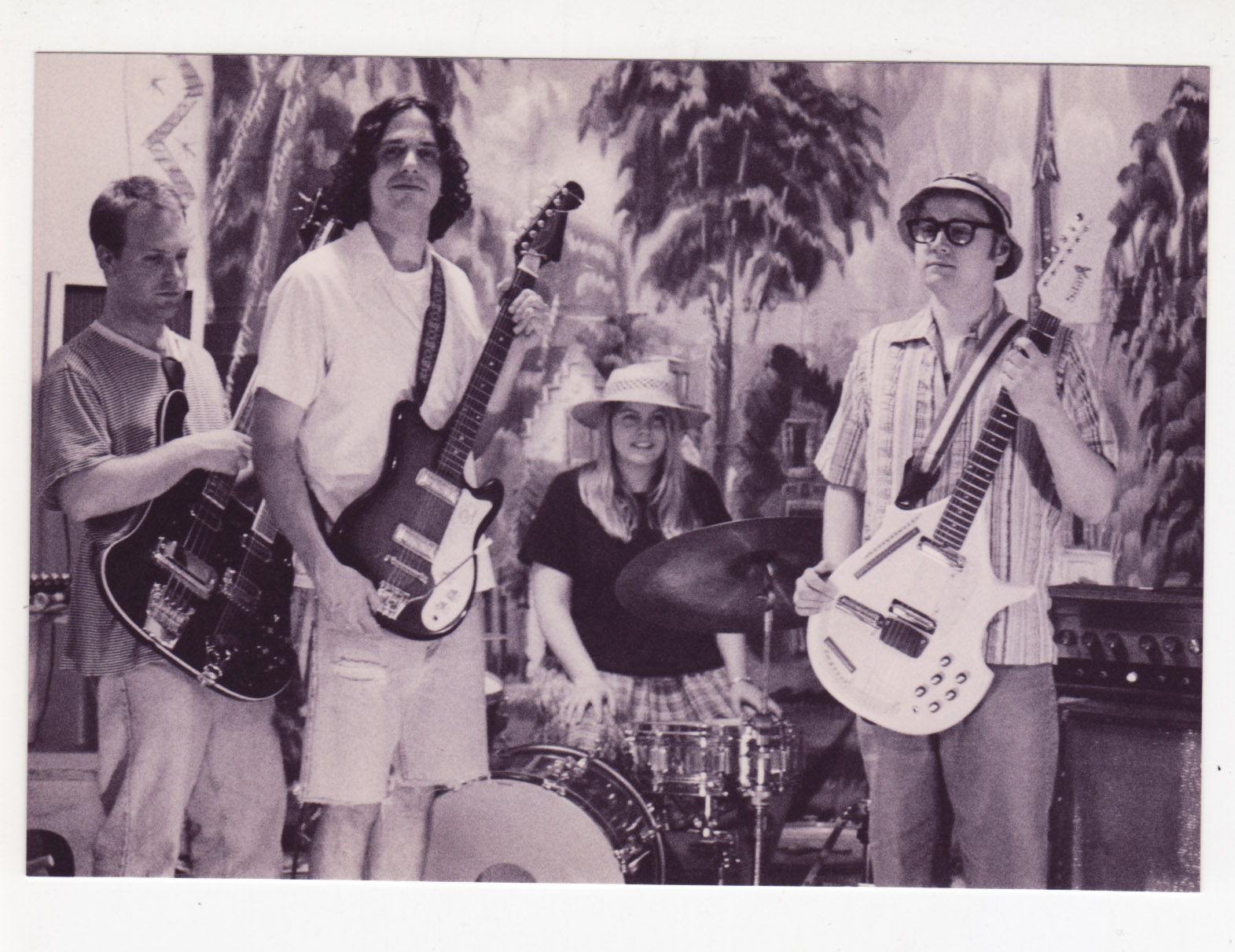
Jennifer: What books or magazines are on your nightstand?
Hilarie: I just finished Bright Young Women by Jessica Knoll. I am currently reading Poor Things by Alasdair Gray. I just saw the movie and it blew my mind! Yorgos Lanthimos has made some of my favorite movies, but this one is incredible, from the camera work, the art, costumes, and music, the entire feel is completely insane.
Jennifer: What are some of your hobbies?
Hilarie: I like sewing; we do a lot of drawing over here, and I am learning lino cutting. Of course, playing guitar, making songs, reading, making earrings (that I can’t even wear because I am allergic, haha), and building things/making things for our van. We got really into our camper van, so we made a headboard out of Moroccan tiles, curtains. I like to sew practical things. I’m going to start on a quilt soon. I love drawing with Per Ole; it can be intimating because he’s so good and I’m so bad.
Jennifer: I love your vehicle.
Hilarie: It’s all I can think about sometimes; it’s like, “I can’t wait to get in the van.” We just put a power converter in it so we can use an electric blanket.
Jennifer: Do you collect anything?
Hilarie: After emptying my mom’s house before she moved into a nursing home and seeing all of the things she collected, I was overwhelmed. It was a nightmare. She had boxes upon boxes of things. I decided then and there that I would not collect anything other than records. Even books. I adore books, but I rarely go back and read any of them unless they are my favorites. Now I only buy/keep the books that are exceptionally great to me. I kept photographs, artwork, letters, my grandmother’s life’s writing, my great-grandfather’s handwritten memoir, my mom’s wedding rings, my grandma’s wedding rings art deco jewelry, and other small mementos. Part of living in Norway has also been an exercise in learning quality vs. quantity, things vs. experiences, etc. It was hard to decide what to bring from the U.S. after we moved.
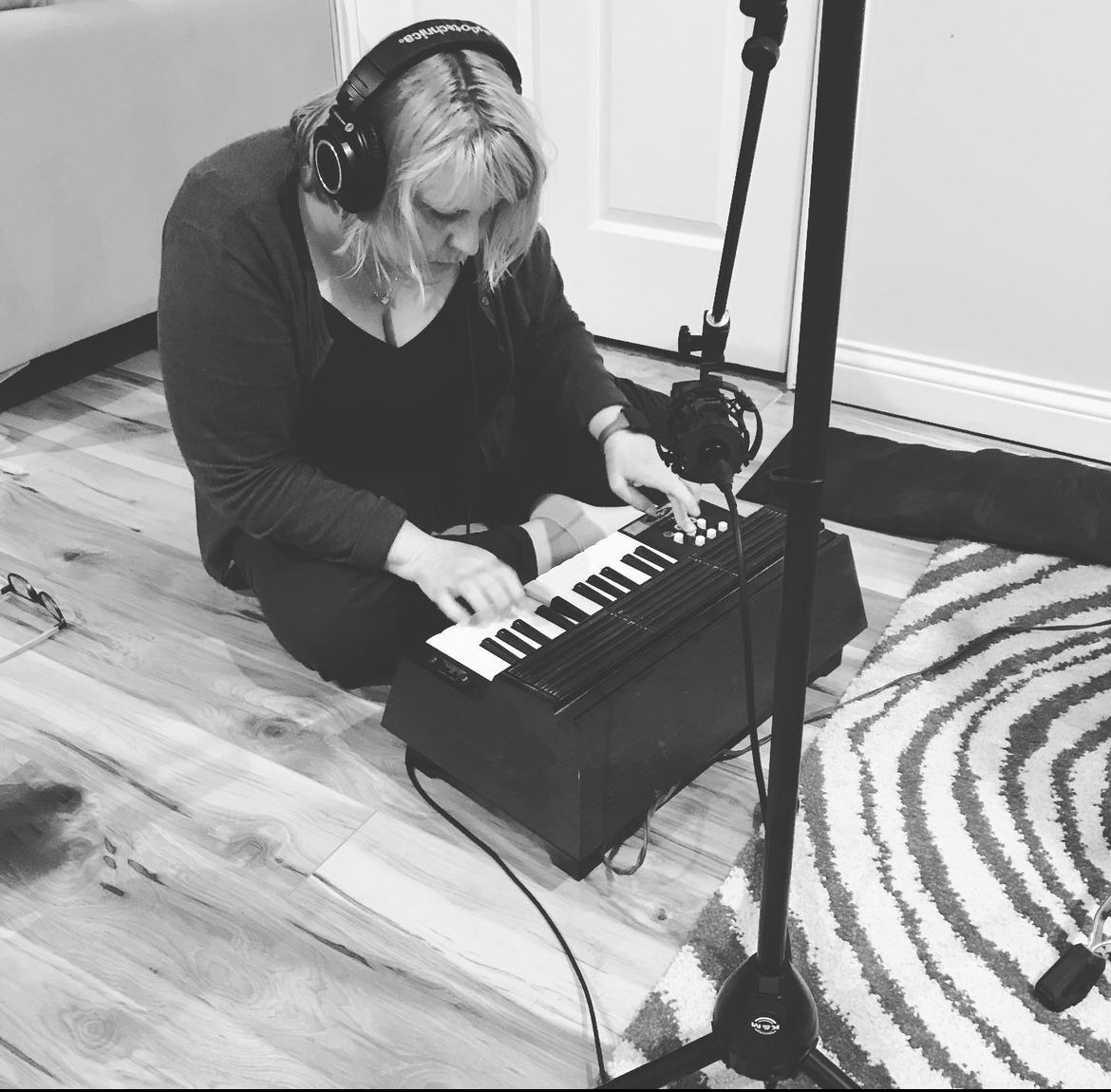
Jennifer: What are the biggest differences about living in Norway and the U.S. and what has it made you appreciate most about each locale?
Hilarie: The biggest differences about living in Norway vs the U.S. are things like consumerism, free time, freedom, and safety in my opinion. I realized a year or so after living in Norway some of the things I missed were heavily based in consumerism. Like, I missed being able to pop in to a store and browse or buy something, or choose from a million different restaurants. Here in Norway everything is closed on Sunday. We have a tiny little part of the grocery store that’s allowed to be open on Sundays for necessities. We get at least 5 weeks of vacation every year and are strongly urged to take at the very least three of them in a row. In Norway you haven’t relaxed enough if you haven’t forgotten what day of the week it is on vacation. We also get feriepenger “vacation money.” We get an extra percentage taken out of our pay each payday and that money is given back to us in June to use on vacation, or whatever we want.
I worked at a university in the U.S. and we had a very liberal vacation policy. 4 weeks. But, getting 3 weeks in a row was supremely challenging. Also, there is a misconception about the taxes we pay. In the U.S. I paid around 24% of my income in taxes. As far as I could tell, I was paying for wars, because my roads were shit, I had to buy more than $100 worth of school supplies for each kid each year, plus a list of things teachers need because they don’t have the funding. Day care was crazy expensive, etc. Here I pay 34%. Both December and June we pay half tax 17% ish so that we have extra money for Christmas and for summer. Included in that 34% is our national health insurance, along with a lot of other great perks like barnetrygd, which gives every single child in Norway $100 per month from the time they’re born until they are 18. That gives families who struggle the money to l buy clothes, pay for activities, etc. to level the playing field and make things more equal. If you don’t need the money, you can just save it. We did that and gave our son Anders a lump sum on his 18th birthday. Because I don’t have to worry about health insurance, I don’t worry about losing my job. Not having to worry about health insurance opens people up to be able to try small businesses and endeavors that they would be afraid to try in the US due to healthcare for example. I love that my youngest son grew up riding his bike to school, playing all over the neighborhood for hours while I didn’t know where he was. I love that he didn’t have active shooter drills. Kids are encouraged to climb up high in trees at school here and to trust and rely on their bodies and motor skills. They learn how to use knives from pre-school, make fires, and really practical things. If we did any of that in the U.S. we might have had a visit from CPS. I miss the openness and friendliness of the U.S. I miss my friends. It’s hard to make close friends here. I miss seeing great bands and eating out a lot. Oddly, there are fewer women in the music scene here. Especially Trondheim, which is the city I’m closest to. I refer to it as “dude rock city.” Oh boy, have I had men explain music, equipment, bands, etc. to me. It’s weird because in most other fields we’re pretty equal.
Jennifer: What are some of your favorite instruments and gear you used on Your Next Wolf?
Hilarie: My favorite is my new Gretsch guitar I bought myself for my birthday last year. It only made it on a couple of tracks, but it is an absolute dream to play, and I love the sound of it. I have a 1964 Roger’s Holiday model drum kit. I had a similar bass drum and rack tom of the same year, but I really wanted this whole kit. It was red sparkle, 20″ bass drum, mounted rack tom, perfect condition, and it came with all the hardware and cymbals, one of which was a staple I used back then, a 24″ Zildjian sizzle cymbal. I went on to buy up as many of those as I could find because they were cheap, and had such a special sound, but I frequently cracked them. Back in the ’90s you found stuff like and it was so cheap because nobody wanted it. Anyway, Kurt Heasley was living with us at the time and he had gotten some publishing money or something, and he actually bought it for me. That is how sweet and generous he is. I am forever grateful. This drumset has been featured on a lot of the early E6 records, including both the Neutral Milk Hotel Records, the Olivia Tremor Control, and The Minders, of course, the Apples, and many others. I’m not as interested in equipment as I was in the past. At this point, I just want reliable things that sound amazing to me and will work when I sit down so I can keep up my momentum while I’m in the mode.
What is your sign?
Hilarie: Capricorn
Jennifer: Do you have any crushes?
Hilarie: I would say now, no, but maybe I’m too old for that. Everybody loves Paul Rudd.
Jennifer: I heard you had a tradition in the past…
Hilarie: Yes, Lisa Janssen and I, she’s from Secret Square, would come up with like, OK, who’s your celebrity dream date this week. It was typically David Berman or Bill Callahan or Steve Malkmus. And then we would decide what we’d do on our dream date.
Jennifer: What musician would you love to interview?
Hilarie: Sun Ra
Jennifer: I have a crush on your dog Archie right now. I seriously have a crush on all big dogs. I’d to meet up with Syd Barrett and Gene Clark. Have you seen the new Syd Barrett documentary?
Hilarie: No. I love Syd Barrett so much. Lisa and I would talk about him endlessly and how we would take care of him.
Jennifer: Are we, like, lost sisters? We might be. What newish and current music are you loving?
Hilarie: I love your new record and that has been spinning quite a bit, I’ve been listening to the new Elf Power, Feeling Figures, The Beths, Aislers Set, Umbrellas, Tony Molina, Telekinesis, Santigold, Shannon Lay, Shana Cleveland, Mikal Cronin, A lot of old bossa nova stuff (Astrud, Nara Leão). Not so new, but it’s some of the stuff I’ve been listening right now.
Jennifer: What plans are you looking forward to in 2024?
Hilarie: We are currently about 9 songs deep into a new album. We have a few more to start, and so there will be a new record later this year or in early 2025. Only time will tell. We are going to start looking for a label to release it. We love Minty Fresh, but they aren’t able to help us very much besides distribution. September is the 20th anniversary of our first record, Songs About the Ocean, and we have a special release coming to celebrate that. I’m super excited about it.
Records Hilarie Cannot Live Without
The Beatles (pretty much any of them, haha)
Velvet Underground, White Light White Heat
Dinosaur Jr., You’re Living All Over Me
Guided By Voices, Alien Lanes
Listen to the High Water Marks.
Preorder the new benefit compilation on Hilarie’s label.
Listen to the Apples in Stereo.
Watch the Elephant 6 documentary.
Read an excerpt from the Steve Keene Art Book, which Hilarie is in.
Read part two of Hilarie’s conversation with Jennifer!
